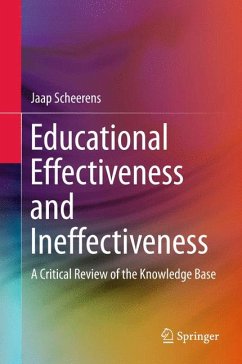This book is a critical assessment of the knowledge base on educational effectiveness, covering a period of five decades of research. It formulates a "lean" theory of good schooling, and identifies and explains instances of "ineffectiveness", like low effect sizes of malleable conditions, for which expectations are highly strung. The book presents a systemic outlook on educational effectiveness and improvement, as it starts out from an integrated multi-level model that comprises system level, school level and instructional conditions. It offers a classification of school improvement strategies and scenarios for system level educational improvement. Above all the analysis is very systematic, comprehensive and strongly grounded in theory. The book includes a case study analysis of various strands of improvement-oriented educational policy in the Netherlands as an illustration of some of the arguments used.
Dieser Download kann aus rechtlichen Gründen nur mit Rechnungsadresse in A, B, BG, CY, CZ, D, DK, EW, E, FIN, F, GR, HR, H, IRL, I, LT, L, LR, M, NL, PL, P, R, S, SLO, SK ausgeliefert werden.









